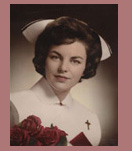 |
 |
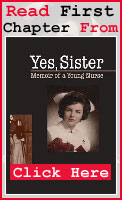 |
 |
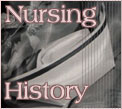 |
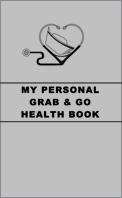 |
| Press Release | 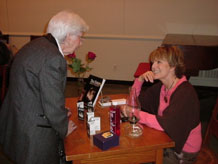 Montreal Launch 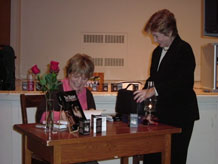 Donna Signing |
| Articles | |
|
Surviving the health care system in the 21st century The Laval News Nursing in author's blood: Grey Nuns taught fortitude needed for career success Calgary Herald Thursday, October 12, 2006 Yes Sister! Nursing is in peril The Suburban 2005-11-09 Former Region nurse writes touching memoirs Frontlines September 27, 2005 Issue #144 |
|
| Book Reviews | |
| Marlene Eisner, The Suburban. Margaret Goldik MONTREAL REVIEW OF BOOKS. Deirdre Gilbert, RN Past Vice President Books and Home Entertainment Editorial Readerâs Digest Canada Ltd. Michael Carin Editor Montreal Business Magazine. Laurie Gottlieb M.Sc. in Nursing, Ph.D., Author Professor at McGill University. Elizabeth Kane Buzzelli Writer, teacher, reviewer. Rosalie Avigdor Vice PresidentöCanadian Writers Society. Aniko KoranyiöBergman PresidentöCanadian Writers Society. * Florence Nightingale lives on·in the 60's Reviewer: Karen Sokoloff from Thornhill, Ontario, Canada CHAPTERS / INDIGO BOOKS |
| Surviving the health care system in the 21st century | 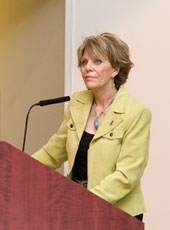 Photo: Peter Varga Retired intensive care nurse and author Donna Yates- Adelman - The simple antidote? Wash your hands |
Medical care must be a team effort, care specialist says Few people would dare ask their doctors to “wash their hands” before being treated for an injury or illness. Yet with the rise in risk of hospital infections in recent years, the question could not be more important. For Donna Yates-Adelman, a career nurse and medical care specialist, that question is the starting point for dealing with a healthcare system that has become more specialized, crowded, and complicated than ever. “One in nine of every Canadian that goes in the hospital gets a hospital infection,” said Yates. “And 8000 of these 250,000 people will die. How do we protect ourselves from getting hospital infections? Wash your hands.” |
|
Limiting health risks
Risk of infection is just one of many challenges that patients face in the 21st century. Speaking at a recent conference of the Jewish General Hospital’s annual Humanization for Care Awareness Week, Yates asserted that patients and their care-givers must work as a team to close dangerous gaps in the healthcare system. Besides infection risks, these include incomplete patient records, and communication gaps that can cause misdiagnoses and mistaken prescriptions. “This is an exciting time,” said the recently retired intensive care nurse, who served as head nurse of surgical intensive care at the Jewish General. “We have more sophisticated treatments, we have more miracle drugs. People are living longer, but they’re not looking after themselves. “We are receiving our care in a fragmented system with built-in gaps. And these gaps can be as small and irritating as a lack of communication that results in a missed appointment, or they can be as large and dangerous as receiving the wrong medication, landing in intensive care, or even death.” Starting out as a nurse 26 years ago, Yates recalled a simpler time when people consulted their family physician, and commonly went to a single hospital for treatment. Today patients often do not have their own personal physician, and must deal with specialists to treat any given problem. “How do we stay out of the gaps?” asked the retired nurse. “We have to move from being a reactive culture, to being a proactive culture.” 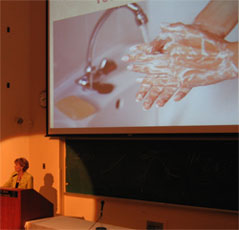 Keeping personal information and keeping informed For starters, Yates recommends people create and keep a “grab and go book,” containing all personal medical information – including a list of doctors, past diagnoses, major health problems encountered since birth, allergies, and medications being taken. “It’ll have what medication – the dose, how often you take it, what you take it for,” as well as the name and number of the doctor who prescribed and ordered the medication, she said. “When you do happen to come in [hospital] for an emergency, you take it with you.” Such a booklet, explained Yates, saves time – particularly in emergencies since it allows medics to start treating patients right away. “By gathering all of this information about your health and your illness, you are an informed patient that can ask informed questions,” explained Yates. This forms the basis of a partnership between doctors, care givers and patients. “You have a dialog. Your treatment and your care is a two-way street with your doctors.” A patient’s responsibility for their own care is ongoing, Yates explained. As such, she encouraged patients to inform themselves on their medical conditions, ask their doctors questions, and be honest with their doctors about the state of their health. In fact, “80 percent of your diagnosis is based on what you tell your doctor,” Yates said. “The other 20 percent are the lab tests and x-rays you get. We tend to think that everything hinges on the lab tests and x-rays, but it doesn’t. So be honest.” Conversely, the doctor’s role is to clearly explain information in easy-to-understand terms, Yates said, in the patient’s own language. Reminding doctors It is also the patient’s right to protect themselves wherever hazardous gaps may exist, said Yates – and that includes infection risks, which are not always adequately covered in hospitals. The simple antidote? Wash your hands. Though it sounds too obvious, Yates underlined that several hospitals and caregivers skirt this preventive measure. Bottom line, “for the 250,000 that get a hospital-acquired infection here [in Canada], it costs $1 billion to treat those infections,” said Yates. Patients are just as responsible for reminding their doctors about it, for their own good. To drive the point home, Yates has called her soon-to-be published book on medical care “Doctor, Have you Washed Your Hands?” This, as the book’s subheading states, will describe “101 tips for surviving the healthcare system for patients, caregivers, family and friends.” Everybody involved in the healthcare system, from doctors to patients, have got to be responsible for health and wellness, Yates said, “and now the public is getting it.” By Peter Varga• TLN |
|
| Nursing in author's blood: Grey Nuns taught fortitude needed for career success |
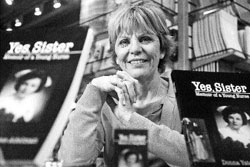 Donna Yates-Adelman chronicles the blood, sweat and tears during her three years of training at the Holy Cross Hospital in the 1960s in her book Yes, Sister: Memoirs Of A Young Nurse. |
|
| Thursday, October 12, 2006 Page: NA04 Section: Neighbours Byline: Sandee Wong Source: Neighbours Donna Yates-Adelman's call to nursing is more than just a career. It is her life. |
||
| The satisfaction of knowing she has made a difference for someone else -- even through small gestures such as offering a drink when a patient's thirsty -- is what drives her and many in her profession. "I have physically retired from nursing (in 1986), but I've never stopped being a nurse," she says. "I've never stopped caring." The need to nurture started early during her childhood in Calgary, when she saw photos of graduating nurses in the homes of families in her North Hill community. "I thought they were angels," she says. "They looked angelic in their uniforms." Yates-Adelman spent three years training at the Holy Cross Hospital under the strict direction of the Grey Nuns from Montreal, an experience she has chronicled in her memoir, Yes, Sister: Memoir of a Young Nurse. Her classmates from the graduating class of 1962 all gave their permission to be in the book and some even read the manuscript, which took seven years to write and three years to get published. "It was their story too," she says. "They all felt the same as I did -- that it was important to tell our story for history and for other nurses. They were all very, very supportive." Yates-Adelman's mother, for whom the book is dedicated, also helped to impart the love of the profession because she herself had wanted to be a nurse. She died before the book was published. Yes, Sister tells the story about the friendships forged among the student nurses, in addition to chronicling the gruelling, gory, sad, touching and sometimes humorous events within the walls of "The Holy" -- which closed in 1996 -- and other hospitals in Alberta where the women trained. "Every day, nurses deal with dying people," says Yates-Adelman, in Calgary recently for the annual Holy Cross Hospital Nurses' reunion where 300 nurses attend yearly. "You have to have a way to release this (stress). Nursing is not a career you can bring home. "We had such a support system. Our support system was built-in. The nurses today don't have that." Not only do nurses today lack this built-in support system, they also are about a decade older than when Yates-Adelman graduated, because of the amount of information nurses need to study today. "With more choices for women, you don't have as many girls going into nursing," adds Yates-Adelman. She chose to train at the Holy Cross -- at the time, one of two hospitals to offer nurses training until the school closed in 1976 (the other is the now-demolished General Hospital) -- because of the reputation of the Grey Nuns. "I felt that I really needed the discipline of the nuns," she says. "One hospital wasn't better than the other. "The Grey Nuns really did have a reputation. The nurses they graduated were ones who really wanted to be nurses." Yates-Adelman, who went to Balmoral and Crescent Heights schools in Calgary, spent most of her career in intensive care and even opened her own clinic in Montreal. Now married with three stepchildren and four grandchildren, she lives in Montreal and writes everyday. She's currently working on novel about a family based in Saskatchewan in the early 1990s. She's also a motivational speaker on a mission to bring the nursing profession to the forefront. "I'm afraid the hospital nurse is disappearing," she says. "It's very difficult. They don't have the time to do their nursing. . . . I feel for them." In its second printing and selling about 1,600 copies, reaction to the book has been positive. "I think the book is a very good portrayal of how nursing was in those days, and how much nurses were involved with patients at the bedside," says Penny Young, who was the class president. "I really enjoyed it." Young, whose maiden name is Priestnall, went into nursing because there were only three career options at the time for women: teaching, nursing and secretarial work. The training she received by the Grey Nuns laid the foundation for a career that took her to Halifax, Cleveland, Chicago and then back Calgary. She is among about seven in a core group from her graduating class who meet annually for the reunion, including Yates-Adelman. "Nursing is nurturing and very much hands-on," says Yates-Adelman. "Nursing moves beyond the (medical) charts. That I would never want to give up. That is what satisfies me. "I miss it every single day." For more information, go online to www.yessister.ca. swong@theherald.canwest.com Illustration: Photo: Ted Rhodes, Calgary Herald / Donna Yates-Adelman chronicles the blood, sweat and tears during her three years of training at the Holy Cross Hospital in the 1960s in her book Yes, Sister: Memoirs Of A Young Nurse. |
||
| Yes Sister! Nursing is in peril | 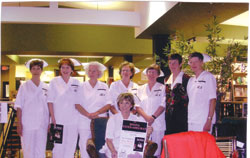 Donna Yates-Adelman, seated, at her book launch in Calgary. |
|
By Marlene Eisner, The Suburban I met Donna Yates-Adelman, author of the newly released book Yes, Sister (Shoreline), about five years ago in an on-line writing group commandeered by writer and former Montrealer, Anne Diamond. Yates was only a few years into getting her story down on paper. It was during a workshop of writers at my house when was I able to hear a chapter of Yatesâs memoir, a work-in-progress of her years as a student nurse at Holy Cross Hospital in Calgary in the early 1960s. |
||
It's always exciting to read a book written by someone I workshopped with, but in Yates's case, it's especially meaningful;
it's taken her eight years to finish her story, the last three to get her writing bound and published, and the result is a remarkably detailed,
historically important account of the stringent schooling nurses once had to go through to practise their noble profession, one that over the
last 40 years has been beaten down into a shadow of its former self. As long as Yates, now 66, could remember, she had always dreamed of becoming a nurse. So being accepted at the highly regarded Holy Cross Hospital to begin three years of nursing education and training, was truly a dream come true. Run by the Grey Nuns, and at the time by the strict director of nursing, Sister Leclerc, nothing could have prepared Yates for the realities of the job, from the exacting adherence to strict rules of conduct and behaviour, to dealing with her first dead body, rude doctors, difficult patients and watching the birth of a severely deformed baby. For the young nursing students at Holy Cross - Yates was only 19 when she began and graduated at 21 - the days were long and serious, filled with study and practical training. The girls bonded quickly, but the regime was tough, with many of the girls dropping out, or being expelled. But for those who remained, enduring friendships were formed, remaining until today. Yates writes as if it all happened yesterday, with a clarity that brings the reader right into the hospital corridors. The stories of her patients, their ailments and problems, as well as her own fears, angst and insecurities, are written in rich detail, and while some passages go on too long, this is forgiven as we are brought right into the moment. We can smell the disinfectant, the putrid infections as the nurse sops up the wound with gauze, and we feel the sorrow when a 19-year-old girl dies from blood loss after trying to give herself an abortion with a douche from a bottle of coca cola. While 1960 was a time of innocence, where Yates and fellow nurse White were able to hitchhike 400 miles to Regina on a weekend to visit Yates's RCMP boyfriend, it's also a time where if a student nurse married during her studies, she was immediately dismissed, and when nuns overseeing doctors let women die from childbirth rather than prescribe birth control. For Yates, her book is more than a personal account of her nursing school experiences; it's a historical perspective of an honourable profession that she says is now dying. "I wanted to document the three-year nursing training that's not happening now," said Yates during a phone interview. "I wanted to champion the nursing profession. It's just disintegrating [and] we are running out of nurses." Nurses no longer are trained in hospitals, she says, and the program has been so reduced, that someone can get their R.N. in 18 months. "How would you like to be looked after by a 18-month R.N.?" she asks. The solution, she says, is that nurses need to be able to nurse, to nurture, and get back to the origins of the profession. "My book shows how nurses want to nurse and need to nurse. A floor nurse has turned into a technician and they hate it because they canât look after their patients." Donna Yates-Adelman will be signing copies of her book at Chapters in Pointe Claire, Saturday, Nov. 12, from 2-4 p.m. This really is a book worth reading. 2005-11-09 13:27:18 |
||
"It (Yes, Sister) is a remarkably detailed, historically important account of the stringent schooling nurses
once had to go through to practice their noble profession...Yates writes as if it all happened yesterday,
with a clarity that brings the reader right into the hospital corridors. A must read!" Marlene Eisner, The Suburban. |
Anyone who knows nursing as it is taught today, in educational settings. should read how it used to be done. Yates-Adelman was a nursing student at Holy Cross Hospital in Calgary in the early
'60s, when nursing was taught in the hospital, in alternating classroom and ward settings. She chronicles her three years of incredibly hard work: among her class of 36 nursing students, only 18 graduated. Some of the stories are funny, some tragic. The reader is given a crash course in how things used to work in the hospital system, when nurses gave backrubs and had time to spend with frightened and worried patients. Since Holy Cross was a Catholic hospital run by nuns, and since Yates-Adelman was Protestant, we learn some hard lessons about birth control and abortion in the years when The Pill was just becoming an option-for some. Yates-Adelman has an interesting story to tell and she tells it in a polished way that draws us right into the world of the student nurses for three fascinating years. Margaret Goldik, MONTREAL REVIEW OF BOOKS |
What is it that transforms inexperienced, naive young women into mature compassionate nurses? Heart, humour, perseverance and courage-and these are evident on every page of Donna Yates-Adelman's delightful coming-of-age story Yes, Sister, Memoir of a Young Nurse. We laugh and cry with Yates as she comes to grips with the challenges and the defeats of her healing profession. This highly readable, sometimes graphic memoir is heart wrenching and hilarious, filled with medical drama and timeless insights. Deirdre Gilbert, RN Past Vice President Books and Home Entertainment Editorial Reader's Digest Canada Ltd. |
This is the fascinating story of a nurse's training and her diverse experiences over a long career on almost every kind of medical ward.It is rich in knowledge, personality and anecdote. But most importantly, it teaches stark lessons that apply directly to the state of medicine in Canada today. Meticulously written and often graphic in its detail, this book can be an important contributor to our country's debate on healthcare.
Michael Carin, Editor Montreal Business Magazine |
A charming memoir of a young woman with a true calling to care. Yates captures the innocence of youth and the coming of age (of the author), whose life was transformed by caring for and witnessing illness, suffering and vulnerability.
Laurie Gottlieb, M.Sc. in Nursing, Ph.D., Author Professor at McGill University |
An honest and intriguing portrayal of the nursing world by one who has lived it from the inside. Engaging. Told directly from the heart.
Elizabeth Kane, Buzzelli Writer, teacher, reviewer |
Yes, Sister, Memoir of a Young Nurse documents one studentönurseâs experiences through Nursing School, tracking her step-by-step initiation into the world of medicine. Every step revealed Donna Yates-Adelman's compassion for the suffering patients.
Rosalie Avigdor, Vice President-Canadian Writers Society |
Yes, Sister, Memoir of a Young Nurse is an odyssey that
begins with Donna Yates-Adelman's years as student-nurse at The Holy Cross Hospital School of Nursing and ends with her graduation and reunion. Her sensitive depiction of the medical world is portrayed mainly through vignettes of miscarriages, abortion, death and her experiences in the O.R., the tuberculosis sanatorium, the pediatric ward, the obstetrics ward, the pavilion for the criminally insane and even the morgue. The reader comes to apprehend the gravity of nursing, the importance of timing, and the exigency of focus and concentration. But more importantly, Donna Yates-Adelman's nursing career restores the reader's faith in a profession that has been reputed to lack sensitivity and revives confidence in medical personnel.
Aniko Koranyi-Bergman, President-Canadian Writers Society |
| *Florence Nightingale lives on·in the 60's | ||
Reviewer: Karen Sokoloff from Thornhill, Ontario, Canada
Date:11/07/2006 10:42:59 AM
I had the distinct pleasure of meeting the author at the recent Toronto
BookExpo and she kindly autographed and presented me with a copy of her book,
Yes, Sister. While I consider myself quite an eclectic reader, I was nervous to
read it. The author was such a warm and lovely woman - what if I didn't like
her book? Not to worry - Yes, Sister reads quickly, though I forced myself to
read it slowly, as I became caught up in Donna's experiences over a three
year period (1959-1962) and commitment to become a nurse. Her honest recall of
patients, staff and fellow nurses, will leave you with much appreciation for
nurses and the true definition of what a 'caregiver' is. The strict
discipline enforced upon the trainees by Sister Leclerc at Holy Cross Hospital,
translates into a wonderful finished product. I couldn't help making comparisions
at times to a movie I saw as a young girl, The Trouble with Angels. These are
very real girls, growing up quickly and responsibly together, yet they still
find time for watching Elvis on Ed Sullivan (and wondering why he was filmed
from the waist up!) and necking with boys and staying out past curfew. A
well told memoir that showcases the authorâs love of her profession and fellow
nurses. Well done! Karen Sokoloff from Thornhill, Ontario, Canada |